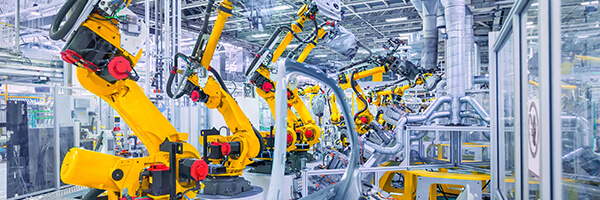Should Manufacturers Buy or Lease Large Equipment?
Sam Addy, Audit Shareholder
March 22, 2018

Earlier this year, the Financial Accounting Standards Board issued an update that will significantly change the way in which lessees and lessors account for leases. The change, which takes effect in 2020, will require businesses to recognize lease assets and liabilities on the balance sheet and to disclose key information about leasing arrangements. However, for the time being, your manufacturing business will still face the quandary over whether to buy or lease manufacturing equipment. The best place to start is with a calculator to crunch the numbers both ways, as a lease and purchase. Visit
Equipment Buy vs. Lease Calculator for a quick and useful resource.
Leasing
Pros
- Lease payments are often 100 percent tax-deductible as an operational expense.
- With predictable payments, you can budget accordingly, possibly allowing for your funds to be stretched further.
- By leasing, you may expand your equipment options since up-front cost is not a factor.
- You might be willing to take a chance on a new piece of equipment that a lump sum payment might bar you from trying.
- Your exposure to additional costs can be eliminated because the leasing company generally handles repairs due to normal wear and tear.
- Though you may “pay more in the long run,” as the numbers often show, when you consider all of the variables involved (repairs if owned), this may not be true.
Cons
- You’ll have no equity and therefore no return on the investment once you are no longer in need of the equipment.
- The length of the lease may exceed your needs.
- By depending on the leasing company to handle repairs, disagreements may arise and you may wait longer than what’s comfortable for something that requires immediate attention.
- It may be that product selection or availability is more limited than what’s offered on the open market. Under these circumstances, you may find yourself settling for something less than ideal.
- Lease payments create a drag on earnings, which could negatively impact operating success metrics, eg. Earnings Before Interest Taxes and Depreciation (EBITDA).
Buying
Pros
- Many points are the flipside of leasing, such as maintenance being handled on your terms.
- Tax incentives under Section 179 of the IRS Tax Code are larger for purchasing but there are limits. However, if the equipment fails to qualify under the code, you would normally be able to apply a depreciation deduction.
- For equipment that has a longer life, similar to a car that you believe will run for more than 150,000 miles, why lease?
- Often times, you will be able to find a financing option that uses the purchased equipment as collateral which can permit a low interest rate.
Cons
- You may find yourself settling for a lower-cost option.
- If the equipment breaks, you won’t be able to return it, or possibly even sell it. Therefore, pay attention to the warranty to see what it covers and for what length of time.
- The purchase through a line of credit may eliminate funding options for other necessary expenses.

- Harmony, Analytical, Communication, Consistency, Empathy
Sam Addy
Audit Shareholder
Sam Addy is an Audit Shareholder at Lutz. He began his career in 1999. He has significant experience in providing accounting, auditing, and consulting services to privately-held companies and employee benefit plans with a focus on the nonprofit, manufacturing, and technology industries.
Recent News & Insights
Accounting
Corporate Transparency Act: BOI Reporting Update
March 24th, 2025 Update: FinCEN has significantly narrowed the scope of BOI reporting ...
Market Commentary
The S&P 500 Enters Correction Territory + 3.19.25
The market volatility that began in February hit a milestone last week. On Thursday, the ...
Rural Hospital
The CFO Outsourcing Option for Hospitals + Why it May Make Sense for You
Is your hospital struggling with financial leadership challenges? You're not alone. As the ...
Recent News
Accounting Today Names Lutz a 2025 Top 100 Firm and Regional Leader
Lutz, a Nebraska-based business solutions firm, has again been named a 2025 Top 100 Firm by ...


Let’s get you where you want to go.
We work to simplify complexities, help make critical business decisions, and confidently focus on the things that are truly important to you. We embrace your business as our own to spark the right solutions and help you thrive.


%20(1)-Mar-08-2024-09-22-41-1011-PM.jpg?width=300&height=175&name=Untitled%20design%20(5)%20(1)-Mar-08-2024-09-22-41-1011-PM.jpg)
%20(1)-Mar-08-2024-09-27-14-7268-PM.jpg?width=300&height=175&name=Untitled%20design%20(6)%20(1)-Mar-08-2024-09-27-14-7268-PM.jpg)

%20(1)-Mar-08-2024-09-11-30-0067-PM.jpg?width=300&height=175&name=Untitled%20design%20(3)%20(1)-Mar-08-2024-09-11-30-0067-PM.jpg)
%20(1)-Mar-08-2024-09-18-53-4361-PM.jpg?width=300&height=175&name=Untitled%20design%20(4)%20(1)-Mar-08-2024-09-18-53-4361-PM.jpg)
-Mar-08-2024-09-03-21-1119-PM.jpg?width=300&height=175&name=Untitled%20design%20(1)-Mar-08-2024-09-03-21-1119-PM.jpg)
-2.png?width=264&height=160&name=Website%20Featured%20Content%20Images%20(1)-2.png)
-Mar-08-2024-08-50-35-9527-PM.png?width=300&height=175&name=Untitled%20design%20(1)-Mar-08-2024-08-50-35-9527-PM.png)


.jpg)




